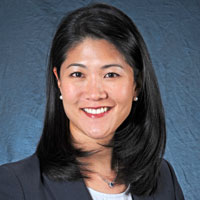Song awarded $1.9M PCORI grant to study new model of health delivery
Sept. 11, 2014
A research team that includes investigators from The University of North Carolina at Chapel Hill has been awarded $1.9 million over three years to study a new model of health delivery. Paula Song, PhD, associate professor of health policy and management at the Gillings School of Global Public Health, is principal investigator of the study.
Song and Marisa Domino, PhD, professor of health policy and management, will work with academics and stakeholders from Ohio and Washington state, along with the Carolina Survey Research Lab, to assess the efficiency and efficacy of accountable care organizations (ACOs) designed to improve care coordination for patients with chronic or complex health-care needs.
The funding comes from the Patient-Centered Outcomes Research Institute (PCORI), which selected Song’s team for the highly competitive grant. PCORI is a nonprofit, nongovernmental organization in Washington, D.C., with a mandate to improve the quality and relevance of evidence available to help patients, caregivers, clinicians, employers, insurers and policy makers reach informed health decisions.
ACOs — groups of health-care providers that organize in new ways to take responsibility for the care of a specific health need population — emerged from the Affordable Care Act as vehicles to improve both the quality and efficiency of health care. ACOs reduce health-care costs by eliminating duplication of services for patients who have several health-care providers, at the same time they improve care by ensuring that other care needs are not overlooked.
Song and her team will focus on children with disabilities, a cohort that requires a wide variety of care from health-care providers, social service agencies, family members and other caregivers.
Increasingly, state Medicaid programs look to ACOs to coordinate care for disabled children. The research by Song and her team will assess care coordination provided by an ACO and note how those interventions affect outcomes for these children and their caregivers.
The traditional fee-for-service model offers no financial incentives for providers to coordinate care. In contrast, ACOs share in any savings resulting from providing high-quality care more efficiently. A recent policy change in Ohio that resulted in 8,000 disabled children being switched from fee-for-service plans to a large pediatric ACO provided a venue for the research.
By using multiple methods, such as focus groups, interviews, surveys, medical record data and Medicaid claims, researchers will compare the benefits and challenges of fee-for-service plans with ACOs. Song and her team will engage some 2,800 patients, their caregivers and health-system stakeholders to gain a complete picture. An advisory panel of caregivers and advocates for disabled children will have input as the study proceeds.
The research results will be relevant to policymakers and care providers.

